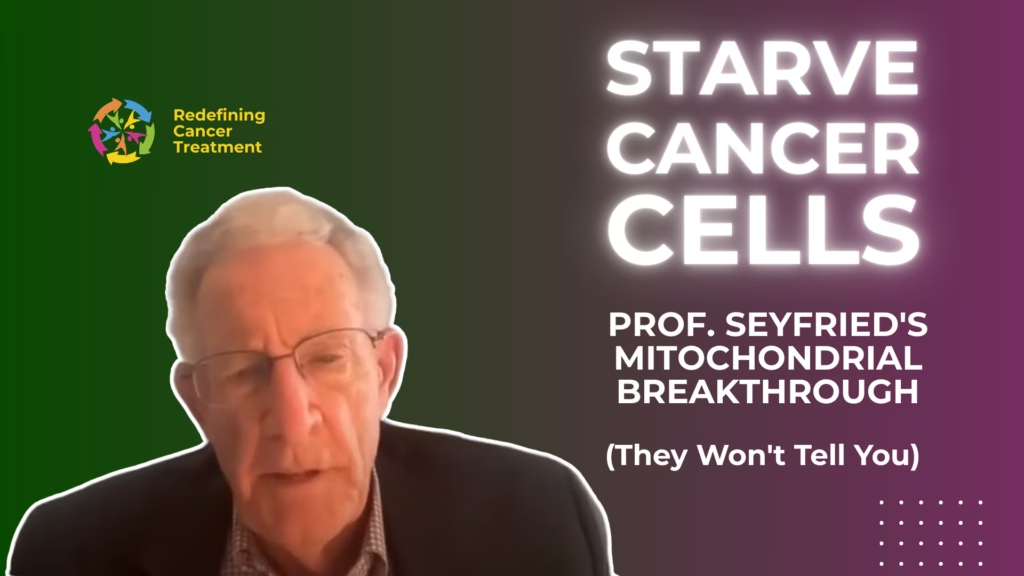
Thomas Seyfried Warns Against Unauthorised Use of His Work in Cancer-Keto Promotions
Dr. Thomas Seyfried Issues Warning: “Stick to My Published Work”⚠️ The cancer researcher clarifies he has no ties to “keto for cancer”
Cancer remains one of the most devastating diseases worldwide, claiming thousands of lives daily. Despite decades of research and advancements in medical technology, the death rate from cancer has shown little significant improvement. This post explores a groundbreaking approach to cancer treatment: metabolic therapy. Based on the insights shared by a leading researcher in the field, this method could revolutionise cancer treatment.
Metabolic therapy focuses on targeting the metabolic vulnerabilities of cancer cells, particularly their reliance on glucose and glutamine for energy. Unlike healthy cells that can efficiently use oxygen to generate energy, cancer cells often rely on fermentation—a process that uses glucose and glutamine as primary fuels. This metabolic shift is driven by defective mitochondria, the powerhouses of our cells.
Research has shown that by depriving cancer cells of these key fuels while supporting healthy cells with alternative energy sources like ketones, we can effectively starve tumours without harming normal tissues.
The ketogenic diet, originally developed in 1921 to manage epilepsy, has gained attention for its potential in cancer therapy. By mimicking the biochemical effects of fasting, this diet reduces blood glucose levels and elevates ketone bodies, which healthy cells can use for energy but most cancer cells cannot.
Studies have demonstrated that maintaining low and steady blood glucose levels through calorie restriction or ketogenic diets can significantly inhibit tumour growth. In fact, spikes in glucose—caused by consuming sugary foods or high-carbohydrate meals—can trigger rapid tumour progression. This highlights the critical role of glucose management in cancer prevention and treatment.
To help patients monitor their metabolic state, researchers developed the Glucose-Ketone Index (GKI), which measures the ratio of blood glucose to ketones. A low GKI (2.0 or below) indicates a metabolic environment unfavourable for tumour growth. Achieving this state often requires dietary interventions such as water-only fasting, restricted ketogenic diets, or other low-carbohydrate approaches.
When patients reach a low GKI, tumours become less aggressive, inflammation decreases, and abnormal blood vessel growth slows down. This creates a more manageable environment for additional therapies to target residual cancer cells.
While metabolic therapy alone shows promise, it can be combined with conventional treatments like chemotherapy, radiation, and immunotherapy—but in a much more strategic way. Instead of using high doses that cause significant toxicity, these treatments can be administered at lower doses and at specific times when tumours are most vulnerable.
For example:
Radiation: Used sparingly after metabolic therapy has weakened the tumour.
Chemotherapy: Administered in smaller doses to minimise side effects while targeting residual cancer cells.
Immunotherapy: Applied as a “finishing touch” after the tumour’s metabolic foundation has been disrupted.
This integrated approach not only improves patient outcomes but also enhances quality of life by reducing the harsh side effects associated with traditional cancer treatments.
Despite its potential, metabolic therapy faces significant resistance from the medical establishment. The current standard of care for cancer treatment is deeply ingrained and often inflexible. Many physicians are hesitant to adopt new methods for fear of professional repercussions or scepticism about their efficacy.
Additionally, there is a lack of widespread awareness about the role of glucose and glutamine in driving cancer growth. Most oncology clinics do not emphasise dietary interventions or metabolic strategies as part of their treatment plans.
This alone could revolutionise cancer treatment.
The evidence supporting metabolic therapy is growing rapidly. By integrating this approach into clinical practice, we could significantly reduce cancer-related deaths and improve patient outcomes. However, achieving this requires a paradigm shift in how we view and treat cancer.
Key steps include:
Educating Physicians and Patients: Raising awareness about the metabolic underpinnings of cancer.
Conducting Clinical Trials: Building a robust body of evidence to support metabolic therapy’s efficacy.
Re-evaluating Treatment Protocols: Incorporating flexible standards of care that adapt to new scientific discoveries.
Cancer treatment is at a crossroads. While traditional methods have made incremental progress, they have not significantly reduced mortality rates. Metabolic therapy offers a promising alternative by targeting cancer’s unique vulnerabilities while preserving healthy tissue.
By embracing this innovative approach and integrating it with existing treatments, we can give patients a better chance at survival—and ultimately transform how we fight one of humanity’s deadliest diseases.
The body is an incredible healing machine when given the right tools. It’s time to rethink our strategies and empower patients with therapies that work with their biology rather than against it. Together, we can pave the way for a brighter future in cancer care.

Dr. Thomas Seyfried Issues Warning: “Stick to My Published Work”⚠️ The cancer researcher clarifies he has no ties to “keto for cancer”

Professor Thomas Seyfried’s groundbreaking metabolic therapy framework reveals how targeting cancer’s energy vulnerabilities—through ketogenic diets and repurposed drugs like Fenbendazole—offers

In this paradigm-shifting analysis of cancer biology, Professor Thomas Seyfried (Boston College) talks about starving cancer cells and dismantles the

Explore the revolutionary insights of Prof. Thomas Seyfried in our latest blog, where we delve into his groundbreaking research on